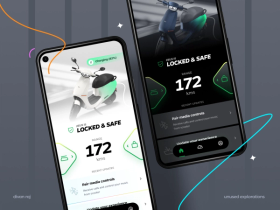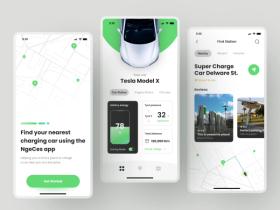As more enterprises and commercial operators shift towards electrification, one question consistently arises: What is EV fleet management, and Why does it matter for your organization?
In simple terms, EV fleet management is the process of coordinating electric vehicles, drivers, and charging infrastructure using digital apps, platforms, and other smart tools. Unlike traditional fleet operations, electric vehicle fleet management emphasizes unique aspects, including battery health, charging schedules, and energy efficiency.
For companies operating delivery vans, service vehicles, or corporate car pools, having the right system in place can make all the difference. The goal is not only to manage vehicles, but also to optimize costs, reduce downtime, and align your business with sustainability targets.
At Stormotion, we’ve seen firsthand how structured digital solutions can help you run your fleet more effectively, whether you’re a growing enterprise or a local client scaling your strategy.
Ultimately, the benefits of electrification go beyond cost savings — they help you build a future-ready, more resilient fleet.
🚘 The Benefits of Electric Fleet Management
The transition to electrification isn’t only about sustainability — it’s also about unlocking measurable value for companies and enterprises. With the right digital solutions, electric fleet management can transform how your business operates every day.
1. Lower Operating and Maintenance Costs
Electric fleets require less servicing than combustion vehicles, which directly reduces maintenance costs. Combined with lower energy prices compared to fuel, your organization can save money on each vehicle. Smart analytics also provide insight into where further efficiencies can be achieved.
2. Optimized Energy Consumption
By tracking energy consumption across your fleet, managers can design smarter charging schedules. This ensures vehicles are powered when needed while avoiding peak grid tariffs. With clear industry insights, it becomes easier to optimize performance and minimize downtime.
3. Sustainability and Compliance
EVs inherently support sustainability goals by reducing emissions. But the added value of fleet software lies in tracking emissions reductions, enabling organizations to reduce their carbon footprint and to maximize the impact of sustainability reporting. This is particularly valuable when engaging client strategy managers or reporting to investors.
4. Improved Productivity Through Real-Time Data
With access to real time data, fleet operators can make faster, more informed decisions. From route planning to driver behavior analysis, connected platforms help you increase efficiency and reliability across operations.
At the same time, integrating renewable energy software development into your roadmap means you’re aligning fleet operations with grid-friendly, sustainable energy usage.
In short, the benefits of going electric extend beyond the vehicles themselves. The right system provides the proof insights you need to guide long-term strategy while delivering immediate cost savings.
🧩 Key Features of EV Fleet Management Software
Choosing the right EV fleet management software means more than tracking vehicles on a map. A modern platform combines hardware integration, smart energy monitoring, and predictive maintenance to create a connected ecosystem for your fleet. Here are the most important features to look for:
Charging Infrastructure and Smart Energy
A reliable charging strategy is the backbone of every electric fleet. By integrating with charging infrastructure and individual chargers, fleet managers can plan efficient charging schedules that avoid peak tariffs and ensure vehicles are always ready. Advanced systems even support smart energy management, balancing loads across multiple sites to build better resilience.
Battery and Maintenance Monitoring
The health of the battery is critical in electric car fleet management. Predictive diagnostics and automated alerts help reduce downtime, extend battery life, and control maintenance costs. These insights also give fleet operators access to actionable data for long-term planning.
Real-Time Analytics and Reporting
Fleet software provides dashboards that deliver real time updates on driver behavior, location tracking, and energy usage. With built-in analytics, managers gain proof insights into fleet performance and can align decisions with both operational and sustainability goals.

Dashboard showing live metrics and performance charts for a vehicle fleet.
(image by Artonest Design Studio)
Scalable Platforms and Provider Integration
From small fleets to enterprise-scale rollouts, modern solutions are designed to grow with your business. By connecting with multiple providers, platforms and apps ensure interoperability with vehicles, chargers, and external systems. This flexibility helps your organization stay future-proof.
In short, these features empower companies not only to manage vehicles more effectively but also to optimize energy, reduce costs, and improve the overall customer and driver experience.
❗️ Challenges in Electric Car Fleet Management
While the advantages of electrification are clear, organizations adopting electric car fleet management also face a unique set of challenges. Understanding these hurdles is the first step to designing a resilient system that supports long-term growth.
- Upfront Investment and Infrastructure
Transitioning to EVs often means higher initial costs for vehicles and charging infrastructure. Businesses must balance the long-term benefits of electrification with short-term budget constraints, especially for local client operations or those pursuing a new local client strategy.
- Maintenance and Battery Lifecycle
Although EVs generally reduce maintenance costs, managing the battery lifecycle remains complex. Variations in charging behavior, usage intensity, and environmental factors can impact longevity. Predictive maintenance systems are critical to reduce unexpected downtime.
- Data Integration Across Platforms
With multiple providers and hardware types involved, ensuring compatibility between systems can be difficult. Fleet operators and client strategy managers often struggle to consolidate data streams into one seamless platform that offers clear analytics.
- Charging Flexibility: Home and Workplace
Managing both depot and home charging is another challenge. Enterprises must design smart charging schedules that account for diverse driver needs, local tariffs, and grid demand — all while ensuring vehicles are road-ready when required.
Despite these obstacles, organizations that invest early in robust electric fleet management strategies are better positioned to build better solutions that scale.
🧑💻 Case Studies: How Stormotion Builds Better EV Solutions
Real-world projects demonstrate how tailored software helps companies overcome challenges and unlock the true potential of EV technology. At Stormotion, we’ve partnered with innovative clients across Europe to deliver scalable, reliable, and future-ready solutions. Each case study below shows how our fleet management software development company can help you achieve measurable results.
Milence – Charging Infrastructure for Heavy-Duty EVs
Milence is building Europe’s largest network of truck charging hubs. We developed an Android-based terminal app that integrates payments, session control, and multilingual support. Drivers can monitor charging sessions in real time, while operators benefit from secure data handling and flexible charging schedules.
Norsk Guardian – Battery Monitoring for Safer Journeys
For Norsk, we built a Bluetooth-enabled companion app to track the battery status of lithium-ion power packs used in boats. The platform collects telemetry, delivers safety alerts, and provides proof insights into battery health.
Egret – OTA Updates for E-Scooter Fleets
Egret, a leading e-scooter manufacturer, faced issues with firmware updates. We developed a native BLE module to handle multi-protocol communication and deliver consistent maintenance support. As a result, the app significantly improved customer satisfaction and retention, helping the company save money on support costs
These examples illustrate how integrating technology into EV operations gives your business access to smarter, more sustainable solutions. With the right digital partner, you can unlock the benefits of electrification faster and with fewer risks.
🔮 The Future of EV Fleet Management
The next decade will transform how fleets operate. Innovations in software, connectivity, and smart energy systems are already reshaping the future of mobility. For fleet operators, the ability to adapt quickly will be the difference between leading the market and falling behind.
AI and Predictive Analytics | Artificial intelligence is redefining how it works in fleet operations. By analyzing patterns in vehicle usage, traffic, and charging behavior, AI delivers proven insights that allow managers to optimize routes, anticipate demand, and reduce downtime before it occurs. |
Smarter Charging and Grid Integration | Tomorrow’s fleets will rely on flexible charging schedules and bi-directional charging (Vehicle-to-Grid). This approach not only lowers energy consumption but also supports grid stability. By aligning with infrastructure upgrades and renewable energy, fleets can save money while meeting sustainability goals. |
IoT and Real-Time Connectivity | With IoT devices integrated into vehicles and chargers, managers will gain real-time visibility across entire fleets. This level of connectivity provides access to data that helps companies and enterprises build better systems for scaling operations. |
Expanding Providers and Client Strategy | As new providers enter the market, enterprises must adapt their client strategy to stay competitive. A flexible platform makes it easier for client strategy managers to integrate new services, expand into home and depot charging, and maximize customer value. |
The future of electric vehicle fleet management isn’t just about adding more EVs — it’s about designing digital ecosystems that unlock long-term efficiency and sustainability for your business.
👂 Takeaways
The shift toward electrification is no longer a distant goal – it’s happening today. Organizations that embrace EV fleet management now gain a competitive advantage through lower maintenance costs, smarter charging schedules, and reduced energy consumption.
By adopting modern EV fleet management software, your organization gains access to real-time data, predictive analytics, and smart tools that help you optimize performance. For companies managing commercial fleets, this means a clear path to reduce costs, to maximize uptime, and align with sustainability initiatives.
At Stormotion, we’ve proven through multiple case studies – from Milence’s charging terminals to Egret’s seamless OTA upgrades for scooter fleets – that digital ecosystems can deliver measurable results. These projects stand as proof of how technology can build better solutions for your business.
👉 Explore our portfolio of EV and IoT projects and see how Stormotion can support your electrification journey.







![Stormotion client Pietro Saccomani, Founder from [object Object]](/static/40e913b6c17071a400d1a1c693a17319/b0e74/pietro.png)




